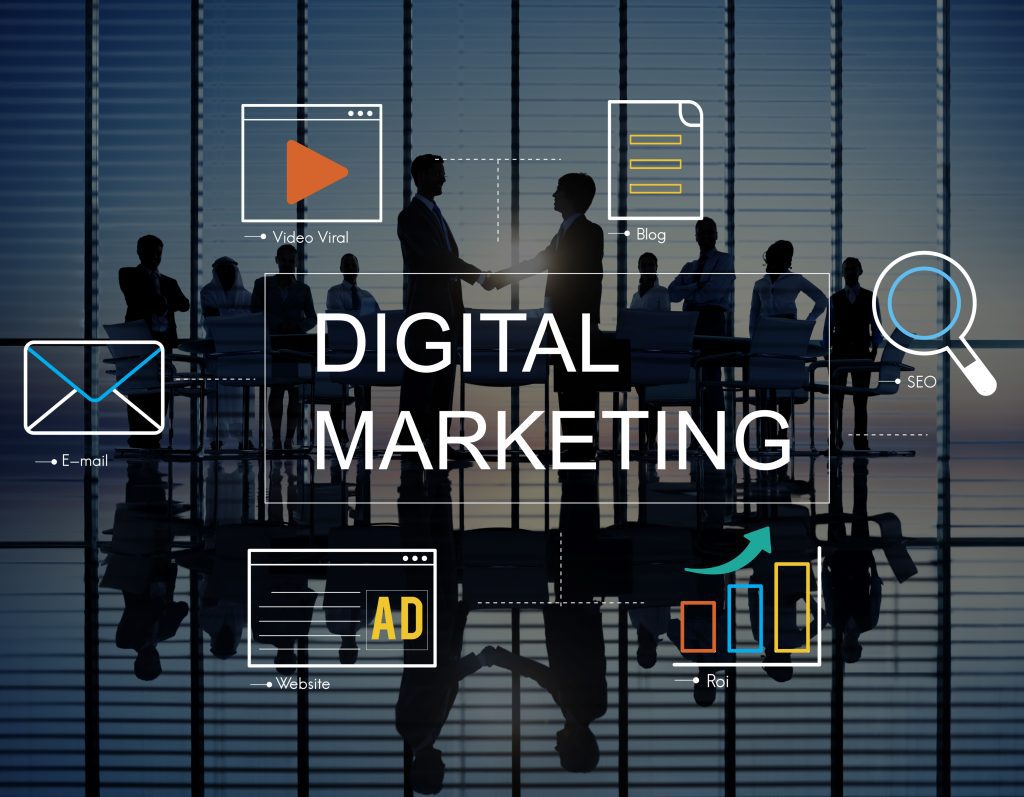Digital Marketing is one of the most effective ways to promote businesses in today’s digital age. For those just starting out, it can feel overwhelming with so many channels and strategies available. This comprehensive guide will walk you through the basics of digital marketing and provide you with actionable steps to get started.

1. Introduction to Digital Marketing
Digital marketing refers to the use of online platforms and technologies to promote products and services. Unlike traditional marketing methods, digital marketing focuses on channels such as websites, social media, and search engines to connect with audiences.
Digital Marketing Tutorial for Beginners is essential for businesses today because consumers spend a significant amount of time online. With the growing number of internet users, businesses that fail to have an online presence risk losing out on potential customers.
2. Types of Digital Marketing
There are several different types of digital marketing, each with its own unique
strategies:
- Search Engine Optimization (SEO): SEO involves optimizing your website
so that it ranks higher in search engine results pages (SERPs). It focuses
on creating content that matches user search intent and includes the right
keywords to attract organic traffic. - Search Engine Marketing (SEM): SEM involves paying for ads on search
engines like Google. These ads appear at the top of SERPs and can drive
instant traffic to your website. - Social Media Marketing (SMM): SMM uses platforms like Facebook,
Instagram, LinkedIn, and Twitter to engage with your audience, build brand
awareness, and drive traffic to your website. - Content Marketing: Content marketing focuses on creating valuable,
informative content that addresses the needs of your target audience, such
as blog posts, videos, and infographics. - Email Marketing: Email marketing involves sending targeted messages to
individuals who have subscribed to your email list. - Affiliate Marketing: Affiliate marketing allows businesses to partner
with affiliates who promote their products and earn a commission on sales.
3. Benefits of digital marketing for businesses
One of the biggest advantages of digital marketing is its global reach. Unlike traditional marketing, which is often restricted by geography, digital marketing allows businesses to connect with customers around the world.
Other benefits include:
- Cost-effectiveness: Many digital marketing strategies, such as SEO and content marketing, can be implemented at a low cost compared to traditional methods.
- Measurable results: Tools like Google Analytics provide real-time data on how well your campaigns are performing, allowing you to make informed decisions.
- Targeted advertising: You can target specific demographics, interests, and behaviors, ensuring your message reaches the right audience.
4. Digital Marketing vs. Traditional Marketing
While both digital and traditional marketing aim to promote products and services, they differ in their approach:
- Digital marketing focuses on online channels such as websites, social media, and search engines. –
- Traditional marketing uses offline methods such as TV, radio, and print ads.
When choosing between the two, it’s important to consider your target audience, budget, and business goals. A combination of both strategies can often be the most effective approach.
5. Creating a Digital Marketing Strategy
A well-thought-out digital marketing strategy is crucial to achieving success. Here’s how you can build one:
- Understand your audience: Research your target market to determine their preferences, behavior, and needs.
- Set clear goals: Whether it’s brand awareness, lead generation, or increasing sales, your goals will guide your strategy.
- Choose the right channels: Based on your audience, select the digital marketing channels that will best help you achieve your goals (e.g., SEO, SMM, or PPC).
6. Search Engine Optimization (SEO)
SEO is one of the most powerful tools in digital marketing, as it helps your website rank higher in search results, driving organic traffic.
- On-page SEO: Focuses on optimizing the content and structure of your website, including keyword usage, meta tags, and URL structure.
- Off-page SEO: Involves building backlinks from other reputable websites to increase your site’s authority.
- Technical SEO: Ensures that your website is fast, secure, and mobile-friendly, which are all important ranking factors.
7. Social Media Marketing (SMM)
Social media is a key component of any digital marketing strategy. Here’s how to use it effectively:
- Choose the right platform: Each social media platform caters to
different audiences. For example, LinkedIn is great for B2B marketing, while
Instagram is ideal for visual content. - Create engaging content: Consistently share high-quality content that
resonates with your audience. This could be anything from informative blog
posts to interactive stories. - Run paid ads: Many social media platforms offer paid advertising options
that allow you to reach a larger, more targeted audience.
8. Pay-Per-Click Advertising (PPC)
PPC advertising allows you to bid for ad placement on search engines or social media platforms. Unlike SEO, which takes time to see results, PPC delivers immediate visibility.
- Search ads: Appear at the top of search engine results pages when someone searches for your keywords.
- Display ads: Appear on websites across the internet in the form of banners, videos, or images.
To run a successful PPC campaign:
- Research your keywords: Choose keywords that are relevant to your business and have a high search volume.
- Set a budget: Determine how much you’re willing to spend on your ads.
- Monitor performance: Regularly track your campaign to see which ads are performing well and adjust as needed.
9. Email Marketing for Beginners
Digital Marketing Tutorial for Beginners is an excellent way to build relationships with potential customers. To get started:
- Build an email list: Use forms on your website or social media to encourage users to subscribe.
- Segment your list: Organize subscribers into different groups based on their behavior or interests.
- Create engaging content: Write emails that are personalized and provide value, whether it’s an exclusive offer or useful information.
10. Content Marketing and Blogging
Content marketing involves creating valuable content that attracts and engages your audience. Blogging is a key component of this strategy, as it allows you to share in-depth insights and drive traffic to your site.
- Write for your audience: Focus on addressing your readers’ pain points and offering solutions.
- Use keywords: Incorporate SEO best practices to help your content rank higher on search engines.
- Promote your content: Share your blog posts on social media and through email marketing to increase visibility.
11. Affiliate Marketing
Affiliate marketing is a partnership where a business rewards affiliates for driving traffic or sales through their promotions.
- How it works: Affiliates use a unique tracking link to promote a product or service. When a user makes a purchase through that link, the affiliate earns a commission.
- Best practices: Choose affiliates whose audience aligns with your target market, and provide them with promotional materials like banners and discount codes.
12. Analytics and Reporting in Digital Marketing
Measuring the success of your digital marketing efforts is essential for continuous improvement. Tools like Google Analytics help you track important metrics such as:
- Traffic sources: Where your visitors are coming from(e.g.,search engines, social media, or direct).
- Bounce rate: The percentage of visitors who leave your site after viewing just one page.
- Conversion rate:The percentage of visitors who complete a desired action (e.g., making a
purchase or filling out a form).
13. Mobile Marketing
As more people use smartphones to browse the internet, mobile marketing has become increasingly important.
- Mobile-friendly website: Ensure that your site is responsive and easy to navigate on smaller screens.
- Mobile Advertising: Consider using mobile-specific ad formats, such as in-app ads or SMS marketing, to reach users on the go.
14. Future Trends in Digital Marketing
Digital marketing is constantly evolving, and staying ahead of trends is key to remaining competitive:
- Artificial Intelligence (AI): AI is being used in digital marketing for predictive analysis, chatbots, and personalized content recommendations.
- Voice search: Optimizing your content for voice search will become more important as voice assistants like Alexa and Siri gain popularity.
- Video marketing: Videos continue to be one of the most engaging types of content, especially on platforms like YouTube and TikTok.
15. Common Mistakes to Avoid in Digital Marketing
To ensure your digital marketing efforts are successful, avoid these common pitfalls:
- Ignoring analytics: Failing to track and measure your campaigns can result in wasted resources.
- Neglecting mobile users: With the increasing number of mobile users, it’s important to optimize your website and ads for mobile.
- Inconsistent branding: Ensure your branding is consistent across all channels to build trust with your audience.
Hyr Digital offers expert web design and digital marketing services. Transform your brand and engage your audience effectively with our tailored solutions.
-
1. What is digital marketing?
Digital marketing is the promotion of products or services through online platforms like search engines, social media, and
email. -
2. Why is SEO important in digital marketing?
SEO helps improve the visibility of your website in search engine results, driving organic traffic and increasing brand awareness.
-
3. What are the best social media platforms for marketing?
Start by identifying your goals, understanding your audience, and selecting the right digital marketing channels to achieve those goals.
-
4. How do I create a digital marketing strategy?
Start by identifying your goals, understanding your audience, and selecting the right digital marketing channels to achieve those goals.
-
5. What is PPC advertising?
PPC (Pay-Per-Click) is a type of online advertising where you pay only when someone clicks on your ad.
-
6. How do I measure the success of my digital marketing campaigns?
Use tools like Google Analytics to track metrics such as traffic, bounce rate, and conversion rate.


